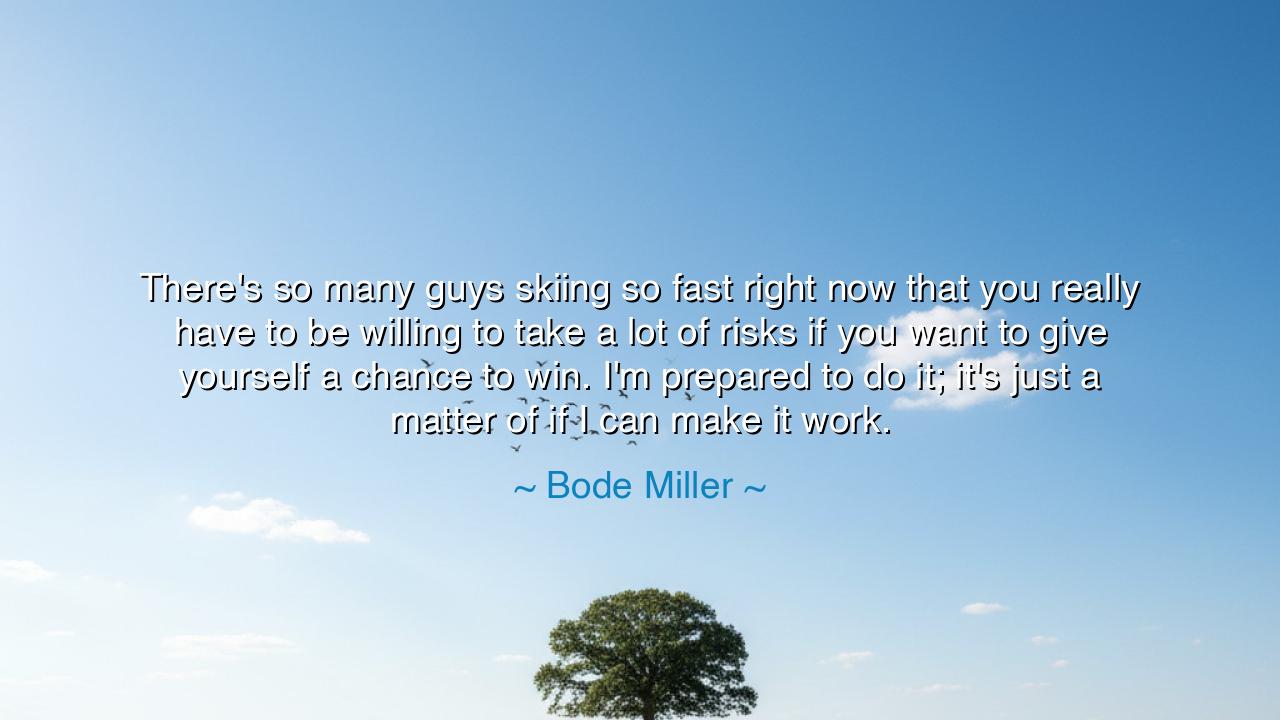
There's so many guys skiing so fast right now that you really
There's so many guys skiing so fast right now that you really have to be willing to take a lot of risks if you want to give yourself a chance to win. I'm prepared to do it; it's just a matter of if I can make it work.






In the words of Bode Miller, "There's so many guys skiing so fast right now that you really have to be willing to take a lot of risks if you want to give yourself a chance to win. I'm prepared to do it; it's just a matter of if I can make it work," we are confronted with the tension between ambition and caution in the pursuit of excellence. Miller, a champion ski racer, acknowledges that to compete at the highest level, one must be willing to embrace risk, as the stakes are high and the competition fierce. This admission of the need for bravery and audacity reveals the essential truth that in any field of greatness—whether in sport, business, or life—success requires a willingness to venture into the unknown, to confront the fear of failure, and to go beyond the ordinary in search of extraordinary results.
This concept of risk and reward is not a new one. The ancient Greeks celebrated the virtue of courage, which was seen as a necessary quality for those who would achieve greatness. In Homer’s Iliad, the hero Achilles is revered not only for his martial skill but for his willingness to take risks on the battlefield, to venture into the heart of danger, where others would hesitate. Achilles' courage is shown in his refusal to stay behind, his willingness to face death in the pursuit of honor and glory. In the same way, Miller speaks of his own commitment to risk, recognizing that only by embracing danger can he hope to achieve the ultimate victory. This ancient idea of bravery is timeless—greatness is never attained without confronting the perils along the way.
Consider the story of Alexander the Great, whose military campaigns were marked by bold, decisive actions that often required him to take risks that others would shy away from. In his famous conquest of Persia, Alexander led his army into unknown territories and faced formidable enemies. Despite the odds, his willingness to act with courage—often against the counsel of his generals—led him to one victory after another. His ability to embrace danger and take risks in battle was key to his success. Alexander’s life teaches us that the path to greatness is not paved by cautious steps, but by the willingness to take risks that others may avoid. Miller, like Alexander, recognizes that to be the best, one must confront danger head-on and see what happens.
In modern times, we see this same mentality reflected in the lives of figures like Steve Jobs, who took monumental risks in the pursuit of his vision for Apple. Jobs’ decision to push forward with radical innovations—such as the iPhone—was not guaranteed to succeed. He faced enormous challenges and setbacks, but his willingness to take risks and challenge the status quo led to a revolution in the tech industry. Just as Miller embraces the need for risk in his sport, Jobs exemplifies the power of visionary courage in business. The lesson here is clear: those who are unwilling to take risks may never reach the heights of success that they desire. Both in sport and in life, the greatest rewards often come to those who are willing to step into unfamiliar territory.
Bode Miller’s reflection on risk is not just about physical danger on the slopes, but about embracing uncertainty in pursuit of something greater. It is about pushing limits, both physical and mental, and challenging what we think is possible. This idea is also present in the story of Sir Ernest Shackleton, the legendary polar explorer. Shackleton’s expeditions were marked by his willingness to lead his men into the unknown, despite the extreme risks involved. His famous Endurance Expedition to Antarctica became a testament not just to survival, but to leadership in the face of overwhelming odds. Shackleton’s ability to confront fear and uncertainty, to embrace risk when others would have turned back, is a profound example of how greatness often lies beyond the boundaries of comfort.
The lesson we can take from Miller’s words is one of balance—the balance between the desire to succeed and the courage to fail. In life, as in sport, the path to greatness is not a straight line, but a series of risks and opportunities that must be navigated. We must be prepared to take chances, to act when others hesitate, and to move forward even in the face of uncertainty. Miller teaches us that while caution has its place, it is through boldness and courage that we achieve things beyond the ordinary.
Therefore, in our own lives, let us take action in the face of uncertainty. Like Bode Miller, we must understand that greatness requires risk, not recklessness, but the willingness to step into the unknown with the courage to act. Whether it is pursuing a career, following a dream, or taking on a personal challenge, we must be prepared to take the risks that will lead to growth and transformation. Like Achilles, Alexander, Jobs, and Shackleton, let us learn to embrace the courageous path, understanding that the rewards of life often lie on the other side of fear. Let us step forward, knowing that it is in the risk that we find our true potential.






AAdministratorAdministrator
Welcome, honored guests. Please leave a comment, we will respond soon